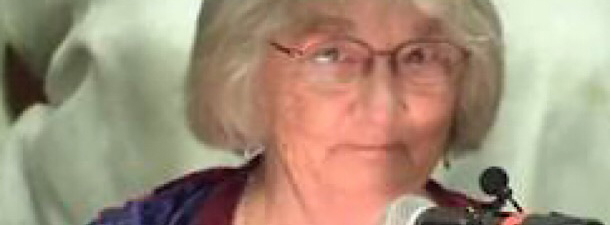Children’s books and more: Interview with author Katherine Paterson

On Sunday, December 3, 2017, the lauded children’s book author Katherine Paterson will appear at Carnegie Library Lecture Hall at 2:30 pm. As part of Pittsburgh Arts and Lectures “Words & Pictures” series the two-time Newbury Medal and National Book Award winner will discuss her acclaimed novels, including her most recent book, My Brigadista Year. In this engrossing historical novel inspired by true accounts, Katherine follows a teenager growing up in Cuba who volunteers for Fidel Castro’s national literacy campaign. The girl braves bandits and other dangers as she ventures into the countryside to help teach her country people how to read.
Katherine is known for her powerful books that often feature preteen or teen protagonists and strong social commentaries. Her young adult fiction is among the most celebrated in the world. Via a recent interview, she discussed her books, their themes, and more.
Meagan Meehan (MM) of Entertainment Vine: How did you discover your talent for storytelling?
Katherine Paterson (KP): I come from a family and indeed a region of storytellers. I can’t remember not being a storyteller myself — I just didn’t write the stories down when I was young.
MM: How did you break into the publishing industry?
KP: After I wrote my first novel, “The Sign of the Chrysanthemum,” which is set in twelfth-century Japan, I went to the library and looked at the books I liked to find the publishers’ names. I made a list and began sending my book out to the names on the list. I had no idea that a novel for young people set in feudal Japan would not be welcomed by most houses. After about eight rejections, my book was taken out of the slush pile of unsolicited manuscripts by the young college graduate who had that fairly thankless job and taken to the senior editor, who had just returned from a trip to Japan. She loved Japan, thought American young people should know more about this fascinating country, and thought I might turn into a writer who might someday write a book that would actually sell enough copies to make the risk worthwhile. Alas, that was in 1970. As far as I can tell, it doesn’t work this way anymore.
MM: Why do you focus on children’s and young adult fiction?
KP: I discovered, much to my own surprise, that I write the kind of stories that young readers appreciate. I feel very fortunate as I have the best readers any writer could hope for.
MM: Some of your books have been banned. Why was this done and how did you handle such decisions?
KP: Various reasons have been given when my books have been challenged or banned — bad language, inappropriateness of a story about death for the young, even incest. No, I didn’t understand the last two either, as children do have to face death, and I believe it’s better to rehearse it in fiction before you have to confront it in real life, and the incest reason is a total puzzler. Many times, I do not know about such incidents, but when I do, I point out the sources of help — ALA, NCTE, etc., — that know how to give real help in these troubling situations. My own reaction is always sorrow. Some teacher or librarian is in trouble because of something I have written. I am humbled that this person is brave enough to risk job and reputation to defend my book. I am also sad about the challengers because I feel that they must be afraid, either for themselves or for their children. Fear is a terrible burden.
MM: Why did you set your latest book in Cuba and, given the strained relationship between the USA and that country, do you think that this book is especially important?
KP: I was so thrilled when I learned about the literacy campaign of 1961, in which 750,000 volunteers, 108,000 of them between the ages of 12 and 18, turned Cuba into a literate nation, that I wanted to tell the story of one of those brave young volunteers.
I think it’s important for the peace of the world that we know good things about our enemies. Our own propaganda is happy to tell us all the bad things, but as cruel a dictator as Fidel Castro was, good things did happen under his regime. Everyone can now read and write. Education is free from preschool though PhD programs, and there is universal access to excellent medical care.
Although I have no right and cannot, in fact, tell readers how to read my book, I can’t help but hope that some young readers might be inspired by those young Cubans and determine to join some cause that would work for the greater good of our country and our world.
MM: What sorts of themes and characters do you find most compelling?
KP: I guess my now 17 novels answer this question better than I can. None of my people have an easy life, but perhaps each of them find the answers to questions they didn’t even know they were asking. And their questions are probably Katherine Paterson’s questions as well.
MM: What is it like to have won so many awards for your writing?
KP: Oh, dear. I was afraid I was going to lose all my friends, but, thank heavens, my friends are better persons than I deserve to have as friends. It occurred to me at some point that certain prizes would cause people to listen to what I had to say, so I’d better say something worth the listener’s time and attention. And I must admit, it is nice not to have to count one’s pennies quite so carefully.
MM: You’re appearing soon at the Carnegie Library Lecture Hall in Pittsburgh. How did that opportunity present itself?
KP: My wonderful publicity team at Candlewick Press arranged this. No one could ask for a better publishing house.
MM: What can guests expect at the event?
KP: An 85-year-old-writer who loves her readers, many of whom now have grown children of their own!
MM: Are you working on any other books right now, and what advice can you give to aspiring authors?
KP: Not at the moment, but I’ve promised to write a biography for young readers about Jella Lepman, the amazing German Jewish woman who started the International Board on Books for Young People. Ms. Lepman believed that children’s books could be a bridge to peace. I agree. As per “My Brigadista Year,” it was a book I loved writing and I hope readers will enjoy reading.
* * * * *
For details and resources for My Brigadista Year, click here.
To watch a video of Katherine Paterson discussing “My Brigadista Year,” see here.
For Katherine Paterson’s Facebook page click here.

